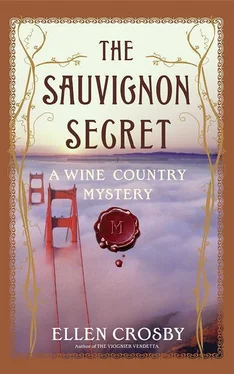“Someday when you’re my age,” she said, “you’ll realize that just simple companionship is more than enough. They could still be together and he wouldn’t have to marry her. She never gave up her French citizenship, so she could go back and live there easy as you please.”
I finished my coffee and stood up. I didn’t want to think about the consequences of what she was saying. Pépé cared for Juliette, that I knew. And, okay, Juliette was a little in love with my grandfather. But what Thelma was implying, that there was some romantic liaison between them that went beyond the very proper behavior I’d witnessed at their party last week, was ridiculous—had I been that blind?
“What do you need, child?” Thelma took my coffee cup and put it in the trash.
I needed to think she was wrong, that her theory was way off base. “Pardon?”
“Besides the muffins. You said you needed a few things.”
“Oh. Milk, bread, peanut butter.”
She wrapped my muffins while I got the items and paid her.
“My grandfather respects Juliette as an old and dear friend,” I said as she walked me to the door. “He’s fond of her, but not in the way you think.”
Thelma’s smile was tinged with sympathy and regret. “You’re his granddaughter. The man’s been alone for more than thirty years. Let me tell you something, Lucille. Juliette Thiessman is a strong-willed woman. If she wants your grandfather, she’ll get him. You can bet the farm on that.”
She adjusted her glasses, blinking hard, and I couldn’t tell if she was holding back tears. Then she squared her shoulders and patted my arm. “I do run on sometimes, don’t I?”
“Not at all,” I said. “Anyway, I guess it’s not up to either one of us what they do, is it?”
“Nope.” She glanced at her watch, back to her old brisk self. “Lordy, will you look at the time? I’m missing Tomorrow Ever After . I just love that show. The people are just so real , you know? And Shay’s about to propose to Amber.”
“Oh, gosh. You don’t want to miss that.”
“Oh, honey, it’s television. This is July. They won’t finish their candlelight dinner on his yacht until sometime in August. Then he’ll take her to his bedroom.”
“Then he asks her?”
“No. They’ll argue—she’s very temperamental—and carry on until she finally tells him she’s pregnant. He’ll pop the question by Labor Day.”
I grinned. “You’d better get back so you don’t miss any of it.”
“I just love Shay,” she said. “He deserves better than Amber. It’s not his baby, you see. But he’s an honorable man and he’ll take care of her because he’s a gentleman. Toodle-oo, Lucille.”
The sleigh bells rang as I closed the door. An honorable man and a gentleman: Had she been talking about Shay or my grandfather?
My phone rang as I was putting the groceries in the Mini.
“Hey,” Kit said. “Pay dirt.”
“You found something in the archives?” I felt breathless. “Maggie’s accident?”
“Sorry, not that. And definitely nothing about Stephen Falcone going missing.”
“Then what?”
“I got to thinking about his sister, since you said he might have lived locally. Call me lazy, but I took the easy route after I couldn’t find anything right away in the archives. I looked up Elinor Falcone on the Internet phone number lookup site. It’s an unusual name.”
“And?”
“Got a pencil or pen?”
“Give me a second.” I fumbled in my purse as my heart pounded against my ribs. “Okay, shoot.”
“There’s an Elinor Falcone, age sounds about right, still living in D.C. Brookland, to be precise. Maybe you want to go pay her a visit?” She gave me the address and phone number.
I looked at my watch. “I can be there in about an hour.”
I raced home to drop off the groceries, since I didn’t want to drive into Washington with a gallon of milk in my car on a sultry summer day. As I pulled into the circular driveway, Eli walked out the front door balancing a plate with a towering deli sandwich, a large bottle of Coke, and a bag of chips big enough to get lost in.
“What’s up?” he said. “You look kind of frazzled. I just took a break to make lunch.”
“I picked up some things at Thelma’s. Where’s Hope?”
“At the Ruins with Jasmine and Dominique. They’re getting ready for tonight.”
I got out of the car and grabbed the groceries. “I’ve got to get this stuff inside. See you later.”
“You’re running like you stole something, Luce. What’s going on? The girls have got things under control.”
“I’m sure they do … uh, actually I’ve got an errand in town. I might be a little late.”
He frowned. “I thought that’s where you just came from.”
“I mean D.C.”
He cocked an eyebrow. “You’re driving all the way to D.C.? Why?”
“I need to see someone. Won’t take long.” I held up the bag. “Better get the milk in the fridge.”
He looked puzzled by the brush-off, but he didn’t push it. “Yeah, sure. See you later.”
* * *
It took me an hour and a half to get into Washington, thanks to a highway-paving project that funneled traffic to a single lane and slowed it to a crawl. By the time I crossed the Potomac over the Teddy Roosevelt Bridge and drove down Constitution Avenue toward the Capitol, the temperature gauge in my car read 105 degrees. In the hazy humidity and blinding sunlight, the Federal Reserve, the Commerce Department, and the Archives seemed to shimmer. Cars, tourists, and even the occasional crazy jogger along the Mall moved with slow motion torpor.
I didn’t know the Brookland area well, except that it was where Catholic University was located, off North Capitol Street and Michigan Avenue. There is an intrinsic logic to how Washington is laid out. A medallion under the crypt in the Capitol Rotunda is the geographic center of a city that originally was intended to be a perfect square—though it isn’t—and from there, four quadrants radiate away from it as northeast, northwest, southeast, and southwest. Within each quadrant, alphabet streets run east-west and numbered streets are north-south in a large grid. What throws off the simplicity are the state-named streets, which cut diagonally across this symmetry and the circles—Dupont, Logan, Thomas, et cetera—which can really screw you up if you don’t know what you’re doing.
Still, it wasn’t too hard to figure out where Elinor Falcone lived. The alphabet streets had moved into two-syllable words by the time I drove past the bright blue mosaic-domed Shrine of the Immaculate Conception, so it was clear that Lawrence Street was between Kearney and Monroe and 13th Street was a block beyond 12th.
The university hadn’t overrun the local community, so there was a mixture of college bars and restaurants, and a corridor of thriving businesses on 12th Street. The surrounding neighborhood of wood, stucco, and brick bungalow homes looked like they dated back to the 1920s or thereabouts.
Elinor lived in the middle of the 1300 block of Lawrence Street in a well-looked-after tan stucco Craftsman-style home. Half a dozen steps led up to a wide front porch with heavy tapered columns, a white railing, and a low-pitched roof. I parked across the street and got out of my car. A frail, white-haired woman sitting in a wheelchair on the porch watched me as I made my way between two closely parked cars and started up her front walk.
“What do you want?” Her high-pitched voice was querulous. “No soliciting allowed here.”
“I’m not soliciting,” I said. “I’m looking for Elinor Falcone. Would that be you, ma’am?”
Читать дальше












